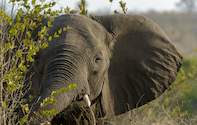
About the Skukuza Area
At Skukuza Camp
Paul Kruger Gate
Phabeni Gate
Phabeni to Skukuza
Rhino Koppies Route
Sabie Sands Loop
Skukuza to Lower Sabie
Skukuza to Satara
Tshokwane and Surrounds
Tshokwane to Lower Sabie
Tshokwane to Satara
See Kruger Park Skukuza Area Self-drive Map
The site where Skukuza Rest Camp stands today was originally known as Sabi Crossing because it was the best place to cross the dangerous river. The first Kruger Park ranger appointed - Barberton policeman Paul Bester - took up his position here in 1898 when the Sabi Reserve was proclaimed. That year, he built the first rondavel at Skukuza. The wildebeest skin he used as a door was regularly torn off by hyaenas at night.

During the Anglo-Boer War, Sabi Crossing was occupied by Steinacker's Horse. The regiment built a small blockhouse on the banks of the river. It was, in the words of lowveld historian TV Bulpin, "a sunbaked little place whose garrison of desperadoes had gambled and quarrelled their days away while the officers had kept discipline by a periodic resort to their fists".
Sabi Bridge then became a siding on the ill-fated Selati railway line. The disused railway bridge lies upstream from the camp as a monument to the intriguing relationship between human folly and get-rich-quick schemes in the lowveld.
It was renamed Skukuza when James Stevenson-Hamilton moved his operational headquarters there, having consolidated his political control over the Park. Skukuza was his nickname, the Shangaan word for "he who turns everything upside down", which was a somewhat bitter reference to his enthusiasm for ridding the Park of its human inhabitants as he transformed Kruger from an over-hunted, disease-ridden outback into one of the world's top game reserves.
The camp is situated close to the confluence of the Sabie, N'waswitshaka and Sand Rivers and is in a particularly game-rich part of Kruger. The thorn thickets and mixed woodlands around the camp usually host animal activity all year round as the Sabie is a major source of water in the southern Park. A survey done in 1970 revealed that 25 leopards lived in a five-kilometre radius of Skukuza camp.

Skukuza offers all the facilities of an established village, including restaurants, police, medical and emergency vehicle repair services. It has the best shopping in the Park and there are a range of activities to keep one entertained during the day while the animals are resting.
A relaxing way to acclimatise to Skukuza is to spend half-an-hour ambling along the tree-lined walkway along the edge of the camp overlooking the reedbeds and sandbanks of the Sabie River. There is often game flitting through the mixed riverine woodland on the banks, and elephant and buffalo regularly come down to the river to drink in front of the camp.
Guests at Skukuza on Christmas Day in 1971 received an interesting present from the Park. A leopard brazenly killed a waterbuck on the river sandbank right in front of the camp restaurant. A day-visitor's area near the main camp has a swimming pool and braai facilities.
Golf at Skukuza Camp

Skukuza course is the only golfing facility in Kruger itself. It is a 72-par, nine-hole, 18-tee course a few kilometres from Skukuza on the road to Paul Kruger Gate. The course is as close-to-nature as one gets, with beautiful bushveld trees, wonderful birdlife and views over Lake Panic.
The Skukuza Golf Course is not fenced in, so a round of golf often provides animal sightings. A lion once killed a buffalo on the first green and on another occasion, a honeymoon couple's golf game was interrupted by a pack of wild dogs chasing an impala across the course.
Parks staff, however, do keep an eye on the area to keep dangerous animals away, and no golfers have ever been harmed by wild animals. Nonetheless, an indemnity form must be signed before teeing off. One should book early to avoid disappointment, and enquire about green fees when making reservations.
Standard golf dress code applies. No caddies are available but there are golf trolleys for hire. The course is closed on Mondays. Tee-off times between 07h00 and 11h30 Sundays to Fridays.
One of the downsides of the Kruger experience can be the amount of time one has to spend in one's vehicle. If one is tired of driving, Skukuza is an ideal place to spend a morning or afternoon because the camp features:
- The best shopping in Kruger for essentials, clothing, craft and curios;
- Photograph processing and development facilities;
- An open-air amphitheatre where wildlife movies are shown every night except Sundays;
- Restaurants and fast-food outlets;
- Plenty of space to walk around - including a walk along the banks of the Sabie River;
- ATMs
- Post office;
- Internet facilities;
- Car hire, car wash and vehicle repair facilities;
- A resident doctor and pharmacy;
- The Stevenson-Hamilton Memorial Library, which is more of a museum than a library, stocking a wealth of memorabilia used by rangers, as well as stone tools and other exhibits;
- The Campbell 1929 Hut Museum which preserves the oldest hut in Skukuza (S1) to show tourist accommodation in the old days;
- A swimming pool; and
- Activities for children, including touch displays and organised outings.

 Skukuza Rest Camp in Kruger National Park is a popular rest camp situated in the heart of Kruger Park. Many visitors think Skukuza Rest Camp...
Skukuza Rest Camp in Kruger National Park is a popular rest camp situated in the heart of Kruger Park. Many visitors think Skukuza Rest Camp...